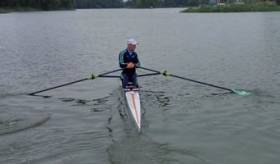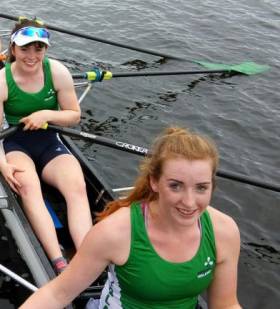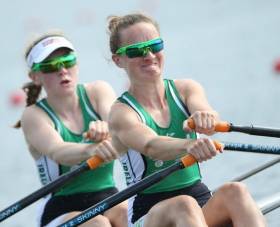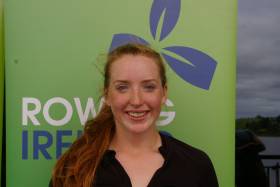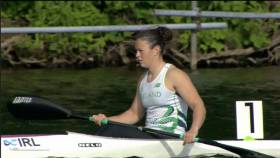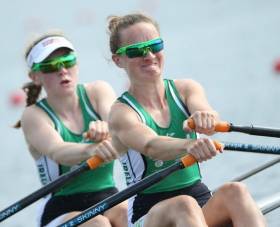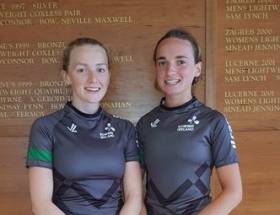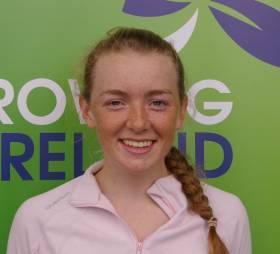Displaying items by tag: Ireland
Ireland's Goff Secures Place in A Final of European Under-23 Champs
#Rowing: Ireland’s Andrew Goff has qualified for the A Final at the European Under-23 Rowing Championships. In beautiful calm conditions with a slight headwind in Kruszwica in Poland, the UCD man took a good second place behind Jan Cibuch of the Czech Republic. Goff started well and once Cibuch took over in the lead Goff stayed comfortably in touch. Sweden’s Filip Nilsson finished third.
European Under-23 Championships, Kruszwica, Poland, Day Two (Irish interest)
Men
Lightweight Single Sculls – A/B Semi-Final Two (First Three to A Final; rest to B Final): 1 Czech Republic 7:34.58, 2 Ireland (A Goff) 7:37.64, 3 Sweden 7:42.26.
Semi One: 1 Austria 7:32.69, 2 Turkey 7:34.45, 3 Slovenia 7:40.16
Ireland's Eight Fifth on First Outing at European Under-23 Championships
#Rowing: Ireland’s women’s eight finished fifth in the race for lanes at the European Under-23 Rowing Championships in Kruszwica in Poland today. The crew of Emily Hegarty (Skibbereen RC), Sadhbh O’Connor (NUIG BC), Oisin Forde (Cork BC), Aoife Corcoran (DULBC), Caoimhe Dempsey (DULBC), Claire Feerick (Neptune RC), Nuala Landers (NUIG BC), Ruth Gilligan (UCD BC), and cox Cormac O’Connell (UCC) will compete in the final tomorrow (Sunday).
Romania won this race, with three other countries quite close behind: Russia, Britain and Belarus. Over 20 seconds further back, Ireland finished ahead of Germany, who were sixth.
European Under-23 Rowing Championships, Kruszwica, Poland (Irish interest) – Day One
Men
Lightweight Single Sculls – Heat Two (First Three to A/B Semi-Final; rest to Repechage): 3 Ireland (A Goff) 8:21.00.
Women
Eight – Race for Lanes: 5 Ireland 7:21.92.
Goff Fights Through Headwind to Qualify for European Under-23 Semi-Final
#Rowing: Ireland’s Adrew Goff has qualified for the A/B semi-finals at the European Under-23 Rowing Championships. The UCD man finished third in his heat this morning in Kruszwica in Poland. Goff started well but, in difficult, headwind, conditions, he yielded the lead to Jan Cincibuch of the Czech Republic, who won well. Goff and Enes Yenipazarli of Turkey, who finished second, then firmly established themselves in the next two qualification places. This was by far the fastest of the heats, with all three qualifiers inside the winning time in heats one and three.
The weather has been extraordinary at the venue: the opening ceremony had to be cancelled because of torrential rain and the temperatures dropped from 30 degrees on Thursday to half that on Friday.
European Under-23 Rowing Championships, Kruszwica, Poland (Irish interest) – Day One
Men
Lightweight Single Sculls – Heat Two (First Three to A/B Semi-Final; rest to Repechage): 3 Ireland (A Goff) 8:21.00.
Cremen and Casey are Rowers of the Month
#Rowing: The Afloat Rowers of the Month for August are Margaret Cremen and Aoife Casey. The Ireland double finished seventh at the World Rowing Junior Championships. The Lee/Skibbereen duo reached the semi-finals in Trakai, Lithuania, but while they could not make the top six they were impressive winners of the B Final, where France tested them. Amongst the countries which did not reach the last 12 were Australia, New Zealand, the United States and China. Twenty-eight countries competed in this discipline.
Cremen and Casey had taken a silver medal at the European Junior Championships in Germany in May. It was another highlight of an exceptional season. Ireland underage crews have been part of the general rise: so far they have taken two medals at the World Under-23 Championships and five at the Coupe de la Jeunesse, a European junior tournament.
Rower of the Month awards: The judging panel is made up of Liam Gorman, rowing correspondent of The Irish Times, and David O'Brien, editor of Afloat magazine. Monthly awards for achievements during the year will appear on afloat.ie. Keep a monthly eye on progress and watch our 2017 champions list grow.
Two Ireland Crews Compete at European Under-23 Rowing
#Rowing: Ireland will compete at the European Rowing Under-23 Championships this weekend. A team of athletes, along with coaches and management, departed for Kruszwica, Poland, earlier this week for the event which takes place on Saturday and Sunday, the 2nd and 3rd of September.
The Ireland women’s eight will be the first crew of this category to compete for the country at a FISA World Rowing event.
UCD’s Andrew Goff, who was part of the Ireland lightweight quadruple which took bronze at the World Rowing Under-23 Championships last month, will compete in the lightweight men’s single sculls. Goff was due to team up in a lightweight men’s double sculls with Niall Beggan, who has been forced to withdraw from racing due to illness.
The women’s eight crew will be made up from seven clubs from Cork, Galway and Dublin. The athletes selected are Emily Hegarty (Skibbereen RC), Sadhbh O’Connor (NUIG BC), Oisin Forde (Cork BC), Aoife Corcoran (DULBC), Caoimhe Dempsey (DULBC), Claire Feerick (Neptune RC), Nuala Landers (NUIG BC), Ruth Gilligan (UCD BC). UCC’s Cormac O’Connell will cox the crew. Coaches John Armstrong and Paul Thornton have travelled to Poland. Denis O’Regan is the team manager.
Kruszwica is a town in central Poland, situated at Lake Goplo. The Kruszwica regatta course is a natural rowing course.
The event includes over 150 entries. Heats and repechages take place on Saturday, followed by semi-finals and finals on Sunday. The draw will be made tomorrow (Friday) afternoon.
Egan Tenth In Dramatic World Championship Final
#Canoeing: Ireland’s Jenny Egan finished 10th in the women’s K1 5,000 metres at the canoe sprint World Championships in Racice in the Czech Republic today. In a dramatic race, Dora Bodonyi of Hungary came out with the gold medal after a long battle with Tabea Medert of Germany, who took silver. Lani Belcher of Britain gritted it out as she found her way through the field and won bronze – near the end she clashed with Iuliana Salakhova of Russia, leaving the Russian in the water and out of the race.
Egan’s chances suffered in rough-and-tumble early stages. She fought hard through the race but could not catch up with the leading group.
Canoe Sprint World Championships, Racice, Czech Republic (Irish interest)
Women
K1 5000 Final: 1 Hungary 23 min 17.862 sec, 2 Germany 23:19.214, 3 Britain 23:28.236; 10 Ireland (J Egan) 24:34.562.
Egan Qualifies for World Championships Semi-Final
#Canoeing: Jenny Egan has qualified for the semi-finals of the K1 200 metres at the Canoe Sprint World Championships. The Irish paddler finished seventh in her heat this morning in Racice in the Czech Republic, taking a place as one of the fastest losers. Her semi-final is secheduled for 2.44 Irish time on Saturday.
Ireland’s Patrick O’Leary will compete in the A Final of the KL3 200, part of the Paracanoe World Championships, also in Racice. O’Leary finished third in his semi-final. His final is scheduled for 1.30 Irish time on Saturday.
#Rowing: Ireland’s double of Margaret Cremen and Aoife Casey won their B Final this morning at the World Rowing Junior Championships in Trakai, Lithuania. The race developed very early into a battle between France and Ireland, with Ireland less than a boat length ahead for much of the 2,000 metres. In the sprint finish, France could not overtake the Irish women.
The result places Ireland seventh overall of the 28 crews which started.
World Junior Championships, Day Five, Irish interest
Women
Junior Double Sculls – B Final (Places 7 to 12): 1 Ireland (A Casey, M Cremen) 7:38.31, 2 France 7:39.65, 3 Netherlands 7:42.20, 4 Ukraine 7:42.25, 5 Japan 7:42.85, 6 Greece 7:44.73.
#Rowing: Ireland’s Aoife Casey and Margaret Cremen will compete in the B Final of the women’s double at the World Rowing Junior Championships in Trakai, Lithuania. In this morning’s semi-final, the Skibbereen/Lee crew took fourth, just under two seconds behind Chile, who took the third qualification spot. Britain were impressive winners, ahead of Italy. Ireland took over in fourth in the second half of the race, but while they finished fast, they could not force themselves in the trio which qualified for the A Final.
World Junior Championships, Day Four (Irish interest)
Women
Junior Double – Semi-Final Two (First Three to A Final; rest to B Final): 1 Britain 7:21.24, 2 Italy 7:25.05, 3 Chile 7:27.62; 4 Ireland (A Casey, M Cremen) 7:29.61, 5 France 7:30.71, 6 Netherlands 7:31.93.
#Rowing: Ireland have qualified for the semi-finals of the women’s double sculls at the World Rowing Junior Championships in Trakai, Lithuania. Aoife Casey and Margaret Cremen finished third in their quarter-final. Canada, who led from the early stages, won well. Ireland had tracked them, holding second from before halfway until the final stages when the Netherlands got ahead of them.
World Rowing Junior Championships, Trakai, Lithuania, Day Three (Irish interest)
Women
Double Sculls – Quarter-Final Three (First Three to A/B Semi-Finals; rest to C/D Semi-Finals): 1 Canada 7:23.78, 2 Netherlands 7:29.52, 3 Ireland (A Casey, M Cremen) 7:30.27; 4 Austria 7:33.56, 5 New Zealand 7:36.51, 6 Estonia 7:52.65.


























